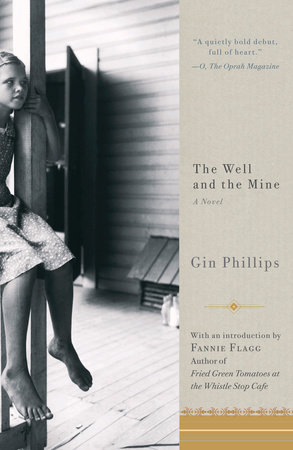The Well and the Mine Reader’s Guide
By Gin Phillips


INTRODUCTION
In 1931, the United States has been plunged into the Great Depression for two years, but poverty and privation are already old acquaintances to residents of Carbon Hill, Alabama. Most local families have had too many mouths to feed for as long as they can remember, but when an unknown woman drops a baby into the Moore family well—with only nine-year-old Tess as a witness—the town is stopped in its tracks by the crime.
The Moores are better off than most. Along with most of the Carbon Hill men, Albert Moore labors in the mines, but he also owns and works a small patch of farmland which allows him to feed his wife, Leta, and his children, Virgie, Tess, and Jack, during the lean times. The family is also known and respected for being quick to help out with a bit of food or a loan—even as the requests become increasingly frequent—which makes the choice of their well even more puzzling.
No one believes Tess, at first, until a baby blanket pulled up in the bucket confirms her story. In no time, the town’s gossip-mongers descend upon their household. Unfortunately, the local police are more interested in harassing the town’s black population than finding the Caucasian baby’s mother. Tess becomes plagued by nightmares and feels certain that the dead infant boy is reaching out and asking her to “figure out who he was. Find who threw him in and give him some peace” (p. 50).
Albert and Leta are too busy keeping the house and farm together to soothe Tess’s fanciful imagination, so her fourteen-year-old sister, Virgie, comes up with a plan to track down the Well Woman—as she comes to be called. The two make a list of all the women they know who delivered babies in the last six months and begin insinuating themselves into their suspects’ lives. Their investigation doesn’t yield an immediate answer but it opens the sisters’ eyes to the complications of life beyond their own small household.
Gin Philips’ award-winning debut novel transports readers to a bygone time and place and introduces a cast of characters that comes vividly alive in all their humor, grace, and humanity. Reminiscent of the writings of Eudora Welty and Carson McCullers, with the emotional resonance of Sue Monk Kidd and Fannie Flagg, The Well and the Mine is rooted in the very best of southern writing but claims a territory all its own.
Gin Phillips lives in Birmingham, Alabama; The Well and the Mine is her first novel.
Just for joining you’ll get personalized recommendations on your dashboard daily and features only for members.
Find Out More Join Now Sign In